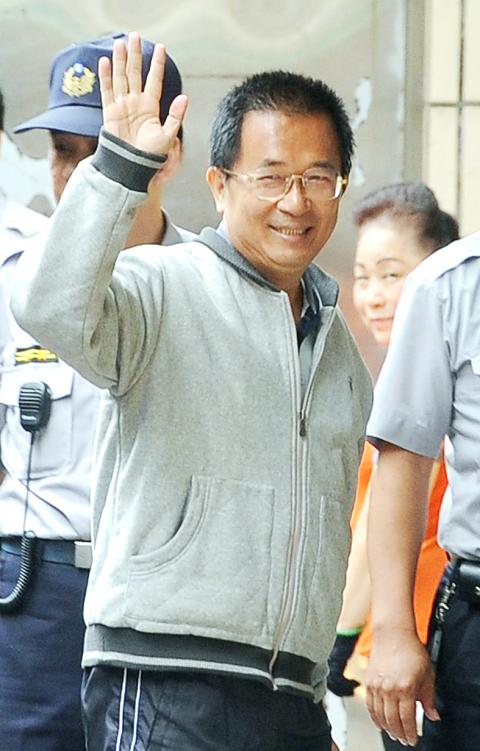Former president Chen Shui-bian (陳水扁) attempted to commit suicide by hanging himself with a towel at a prison hospital in Greater Taichung on Sunday night, but was stopped by a caretaker, the Ministry of Justice said yesterday.
Deputy Minister of Justice Chen Ming-tang (陳明堂) said that Chen, who is serving a 20-year jail sentence for corruption, was distraught that public funds could now be spent legally in hostess bars, while the courts had found his use of them for diplomatic projects to have been a criminal offense.
Chen Shui-bian was apparently referring to former independent legislator Yen Ching-piao (顏清標), who was sentenced to three-and-a-half years in prison for the misuse of public funds in hostess bars during his term as Taichung County Council speaker, but who may be released from jail once an amendment to the Accounting Act (會計法) is promulgated.

Photo: AFP
The deputy minister said that at 9pm on Sunday, Chen Shui-bian tied a towel to a 90cm high shower fitting in his bathroom and attempted to hang himself.
A caretaker stopped him and medical staff then checked his blood pressure, heartbeat and other vital signs.
Chen Ming-tang said that Chen Shui-bian’s condition was stable.
The deputy minister added that Chen Shui-bian’s medical team asked him why he had tried to commit suicide.
According to Chen Ming-tang, Chen Shui-bian said he was upset that his bid to rejoin the Democratic Progressive Party had not gone well, and also because the involvement of elected officials and professors in irregularities related to the use of public funds could be decriminalized following the passage of the public funds amendment, while his use of public funds on diplomatic projects would not be decriminalized.
The deputy minister added that the prison hospital sent a psychiatrist from Taichung Veterans General Hospital to visit Chen Shui-bian.
The ministry on April 19 transferred Chen Shui-bian from Taipei Veterans General Hospital to Taichung Prison’s Pei Teh Hospital, where a special medical zone was set up for him.
The former president has been diagnosed with severe depression, sleep apnea, non-typical Parkinson’s disease, a speech disorder and mild cerebral atrophy.
His office confirmed his suicide attempt in a press release yesterday afternoon.
Citing a prison staffer’s conversation with Chen Shui-bian, the office confirmed that the former president had tried to kill himself because of his anger over the decriminalization of hundreds of university professors’ and local councilors’ irregular use of public funds.
Chen Shui-bian’s son, Chen Chih-chung (陳致中), wrote on his Facebook page that his father was calling for “a uniform standard” to be set for all legal proceedings, rather than different standards for specific individuals.
“I cannot accept [the double standard], nor could anyone; let alone someone with serious illnesses,” Chen Chih-chung wrote.
“Chen Shui-bian’s health suffers a blow every time he sees that someone else has received preferential treatment,” said Janice Chen (陳昭姿), spokesperson for Chen Shui-bian’s private medical team.
In response, Chen Ming-tang said that Yen would be released from jail once the amendment to the Accounting Act is promulgated.
He said the ministry looked into Yen’s case yesterday and decided that Yen’s case would be applicable under the new law.
Additional reporting by Jake Chung and CNA

DAREDEVIL: Honnold said it had always been a dream of his to climb Taipei 101, while a Netflix producer said the skyscraper was ‘a real icon of this country’ US climber Alex Honnold yesterday took on Taiwan’s tallest building, becoming the first person to scale Taipei 101 without a rope, harness or safety net. Hundreds of spectators gathered at the base of the 101-story skyscraper to watch Honnold, 40, embark on his daredevil feat, which was also broadcast live on Netflix. Dressed in a red T-shirt and yellow custom-made climbing shoes, Honnold swiftly moved up the southeast face of the glass and steel building. At one point, he stepped onto a platform midway up to wave down at fans and onlookers who were taking photos. People watching from inside

A Vietnamese migrant worker yesterday won NT$12 million (US$379,627) on a Lunar New Year scratch card in Kaohsiung as part of Taiwan Lottery Co’s (台灣彩券) “NT$12 Million Grand Fortune” (1200萬大吉利) game. The man was the first top-prize winner of the new game launched on Jan. 6 to mark the Lunar New Year. Three Vietnamese migrant workers visited a Taiwan Lottery shop on Xinyue Street in Kaohsiung’s Gangshan District (崗山), a store representative said. The player bought multiple tickets and, after winning nothing, held the final lottery ticket in one hand and rubbed the store’s statue of the Maitreya Buddha’s belly with the other,

Japan’s strategic alliance with the US would collapse if Tokyo were to turn away from a conflict in Taiwan, Japanese Prime Minister Sanae Takaichi said yesterday, but distanced herself from previous comments that suggested a possible military response in such an event. Takaichi expressed her latest views on a nationally broadcast TV program late on Monday, where an opposition party leader criticized her for igniting tensions with China with the earlier remarks. Ties between Japan and China have sunk to the worst level in years after Takaichi said in November that a hypothetical Chinese attack on Taiwan could bring about a Japanese

MAKING WAVES: China’s maritime militia could become a nontraditional threat in war, clogging up shipping lanes to prevent US or Japanese intervention, a report said About 1,900 Chinese ships flying flags of convenience and fishing vessels that participated in China’s military exercises around Taiwan last month and in January last year have been listed for monitoring, Coast Guard Administration (CGA) Deputy Director-General Hsieh Ching-chin (謝慶欽) said yesterday. Following amendments to the Commercial Port Act (商港法) and the Law of Ships (船舶法) last month, the CGA can designate possible berthing areas or deny ports of call for vessels suspected of loitering around areas where undersea cables can be accessed, Oceans Affairs Council Minister Kuan Bi-ling (管碧玲) said. The list of suspected ships, originally 300, had risen to about